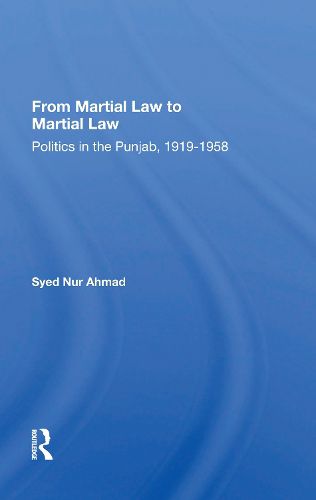Readings Newsletter
Become a Readings Member to make your shopping experience even easier.
Sign in or sign up for free!
You’re not far away from qualifying for FREE standard shipping within Australia
You’ve qualified for FREE standard shipping within Australia
The cart is loading…






This edited translation of Syed Nur Ahmad’s landmark study, Martial Law to Martial Law, provides the most comprehensive study in English or Urdu of the politics of the Punjab. Drawing on his career as a journalist and as former director of information for the government of the Punjab, Nur Ahmad gives an eyewitness account of the politics of the province from the imposition of martial law in 1919 (following the Jalianwala Bagh massacre) to the reestablishment of martial law accompanying the coup d'etat led by General Ayub Khan in Pakistan in 1958. Nur Ahmad relates the events in the Punjab to the larger Indian Muslim political scene, assesses the development and eventual decline of the Unionist Party (which stood against the partition of India), and traces the rise of support for the Muslim League. He also looks at the post-independence period in Pakistan and the failure of the parliamentary regime, discussing how national-level politics affected the Punjab._
$9.00 standard shipping within Australia
FREE standard shipping within Australia for orders over $100.00
Express & International shipping calculated at checkout
This edited translation of Syed Nur Ahmad’s landmark study, Martial Law to Martial Law, provides the most comprehensive study in English or Urdu of the politics of the Punjab. Drawing on his career as a journalist and as former director of information for the government of the Punjab, Nur Ahmad gives an eyewitness account of the politics of the province from the imposition of martial law in 1919 (following the Jalianwala Bagh massacre) to the reestablishment of martial law accompanying the coup d'etat led by General Ayub Khan in Pakistan in 1958. Nur Ahmad relates the events in the Punjab to the larger Indian Muslim political scene, assesses the development and eventual decline of the Unionist Party (which stood against the partition of India), and traces the rise of support for the Muslim League. He also looks at the post-independence period in Pakistan and the failure of the parliamentary regime, discussing how national-level politics affected the Punjab._